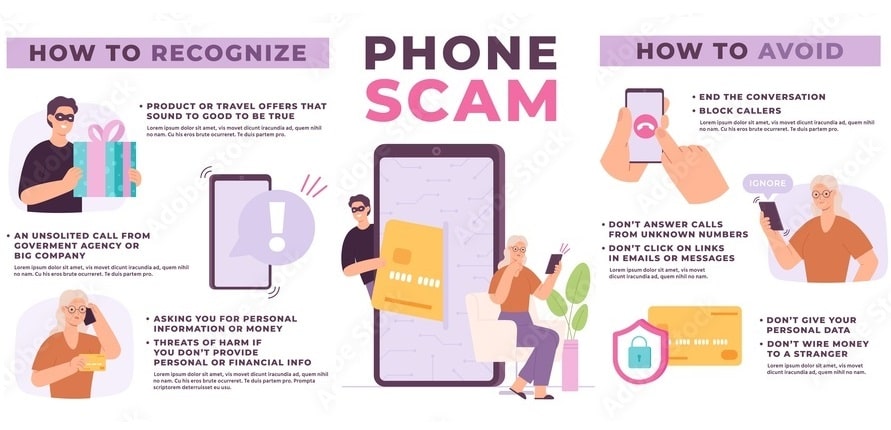Phone scams are a prevalent form of fraud where scammers use deceptive tactics to manipulate individuals into providing personal information or sending money over the phone. These scams come in various forms, targeting people of all ages and backgrounds. In this guide, we’ll explore 15 common phone scams, along with strategies to recognize, avoid, and report them.
15 Phone Scams You Need to Know About in 2024
Phone scams come in various forms, and scammers are constantly evolving their tactics to deceive unsuspecting individuals. Here are 15 common phone scams to be aware of:
1) IRS Impersonation Scam: Scammers pose as IRS agents, claiming that you owe back taxes or have a warrant for your arrest due to unpaid taxes. They often threaten legal action if you don’t pay immediately.
2) Tech Support Scam: Scammers call pretending to be from a tech support company, claiming that your computer has a virus or malware. They may try to convince you to grant them remote access to your computer or buy unnecessary software or services.
3) Grandparent Scam: Scammers call pretending to be a grandchild in distress, claiming to be in an emergency situation and in need of money. They rely on the victim’s concern and emotions to trick them into sending money.
4) Banking Scam: Scammers impersonate bank representatives, claiming that there’s an issue with your account or suspicious activity. They’ll then ask for personal information or request that you transfer money to a “secure” account.
5) Utility Scam: Scammers pretend to be from a utility company, such as electricity or water, threatening to shut off services unless immediate payment is made over the phone.
6) Lottery or Prize Scam: Scammers inform victims that they’ve won a lottery or prize, but to claim it, they must first pay taxes or processing fees. The prize doesn’t exist, and the victim ends up losing money.
7) Medical Scam: Scammers offer fake medical products or treatments over the phone, claiming they can cure serious illnesses or provide miracle remedies. They often target vulnerable individuals with health concerns.
8) Charity Scam: Scammers pose as representatives of well-known charities, soliciting donations over the phone. However, the money doesn’t go to the charity but into the scammer’s pocket.
9) Loan Scam: Scammers offer loans with attractive terms over the phone but require upfront fees or personal information as a condition. After receiving payment or information, they disappear without providing the promised loan.
10) Romance Scam: Scammers develop romantic relationships with victims over the phone, gaining their trust before asking for money or financial assistance. They often target individuals on dating websites or social media.
11) Jury Duty Scam: Scammers call pretending to be court officials, claiming that you’ve missed jury duty and must pay a fine or face legal consequences. They may ask for personal information or payment details.
12) Family Emergency Scam: Similar to the grandparent scam, scammers impersonate family members in distress, such as a child or sibling needing urgent financial help due to an accident or legal trouble.
13) Social Security Scam: Scammers claim to be from the Social Security Administration, informing victims that their Social Security number has been suspended or compromised. They then request personal information or payment to resolve the issue.
14) Investment Scam: Scammers offer lucrative investment opportunities over the phone, promising high returns with low risk. However, the investments are fake or non-existent, and victims end up losing their money.
15) Employment Scam: Scammers pose as employers offering job opportunities, requesting payment for training materials, background checks, or equipment. They may also steal personal information under the guise of hiring procedures.
These scams often rely on creating a sense of urgency, exploiting emotions, or offering too-good-to-be-true deals to manipulate victims into providing money or sensitive information. It’s essential to stay vigilant and verify the legitimacy of any unexpected phone calls or requests for personal or financial information.
How to Recognize Scam Phone Calls ?
Recognizing scam phone calls can help protect you from falling victim to fraudulent schemes. Here are some tips to identify potential scam calls:
- Caller ID Spoofing: Be cautious of unfamiliar numbers, especially if they claim to be from official organizations or companies.
- Pressure Tactics: Watch out for calls that create urgency, threaten legal action, or demand immediate payment or personal information.
- Requests for Personal Information or Payment: Avoid providing sensitive information or making payments to unsolicited callers.
- Unsolicited Offers or Promotions: Be skeptical of offers that sound too good to be true and research companies before providing any information or making payments.
- Robocalls and Automated Messages: Beware of recorded messages urging you to take action or provide information.
- Unsolicited Technical Support: Don’t trust calls claiming to be from tech support companies unless you initiated contact.
- Emotional Manipulation: Be cautious of callers who use personal stories or ask for help in a suspicious manner.
- Too Good to Be True: Trust your instincts and be wary of anything that seems too good to be true or out of the ordinary.
How to Avoid Phone Scams ?
Avoiding phone scams requires a combination of skepticism, caution, and awareness. Here are some tips to help you steer clear of phone scams:
- Verify Caller Identity: Always verify the identity of callers, especially if they claim to be from companies or organizations.
- Exercise Caution with Unsolicited Calls: Be wary of unsolicited calls, particularly those offering unexpected prizes, services, or investments.
- Guard Personal Information: Refrain from sharing sensitive information like Social Security numbers or financial details over the phone.
- Don’t Rely Solely on Caller ID: Caller ID can be spoofed, so trust your instincts rather than solely relying on it.
- Stay Informed: Educate yourself about common phone scams and their tactics to recognize and avoid them.
- Register for Do Not Call List: Consider registering your number on the National Do Not Call Registry to reduce telemarketing calls.
- Use Call Blocking Features: Employ call-blocking features or apps to prevent unwanted calls and known scam numbers.
- Report Suspicious Calls: Report any suspicious calls to relevant authorities to help prevent others from falling victim to scams.
How to Report a Scam Phone Number ?
Reporting a scam phone number is an important step in helping to prevent others from falling victim to similar scams. Here’s how you can report a scam phone number:
- FTC Complaint: Visit the Federal Trade Commission (FTC) website or call their toll-free number. To file a complaint about the scam phone number.
- CFPB Complaint: Report the scam phone number to the Consumer Financial Protection Bureau (CFPB). If it involves financial products or services.
- FCC Complaint: Submit a complaint to the Federal Communications Commission (FCC) through their website or toll-free number for unwanted calls, including scam calls.
- BBB Complaint: File a complaint with the Better Business Bureau (BBB) online. Or contact your local BBB office regarding the scam phone number.
- Local Law Enforcement: Contact your local law enforcement agency to report the scam phone number and potentially initiate an investigation.
- Phone Service Provider: Inquire with your phone service provider about reporting scam calls and blocking numbers to prevent future scams.
- Online Reporting Websites: Use online platforms dedicated to collecting reports of scam phone numbers. To warn others about potential scams and contribute to awareness efforts.
Remember to provide as much information as possible when reporting a scam phone number. Including the phone number itself, the nature of the scam, and any relevant details about the call. Your report can help authorities and regulatory agencies take action against scammers and protect consumers from falling victim to similar schemes.
Also Read :

